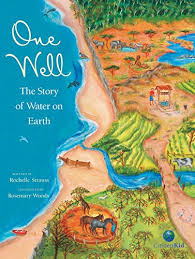If you think of all the water on earth fitting inside a tanker truck, then all the freshwater would fill a bathtub. A lot of that freshwater is trapped in glaciers and ice we can’t access. The accessible freshwater would fill 9 soda cans!

Strauss, Rochelle. One Well: The Story of Water on Earth. Rosemary Woods, Illustrator. Tonawanda, NY: Kids Can Press, 2007. Print.
Genre: nonfiction picturebook
Summary: Through a cyclical exchange of jarring facts and stunning illustrations, readers grasp the complex water cycle on Earth, as well as each living creature’s dependence upon clean water. Explanations zoom in and pan out repeatedly, underscoring the interconnected networks that exist between oceans and clouds, glaciers and rivers, you and me and the one water we share.
Critique: Strauss’s text and Woods’ whimsical illustrations present gripping and shocking statistics in a quaint fairy tale tone. Once upon time, there was a world without water. When water did appear, it was never any more and never any less. It was always the same amount, forever. Everyone had to share it.
A dulcet, bedtime tone may strike some as inappropriate for informative nonfiction, but I argue it is entirely apt. How did the Grimm brothers keep little children from sucking their thumbs? They told dulcetly toned stories about Struwwelpeter getting his thumbs hacked off.
The lesson: reality blows, but at least you can soften the impact.
The result is an effective presentation of otherwise dense information. Young readers get to see how water is typically used and/or wasted in the average household, how much water is needed to produce the items they use in daily life, and how much water churns through their bodies and the bodies of plants and animals they recognize. Expanding like a mosaic, the book stretches the child’s worldview to include how other people around the world go without clean water for drinking or bathing. By the end of the text, the meaning of “one well” also stretches beyond “a single water source,” taking on a deeper, almost Buddhist implication: If you are not well (without water), then I cannot be well (for I have too much). Therefore, if I am to be well, I must conserve and recycle more so that you can be well, too.
Comments